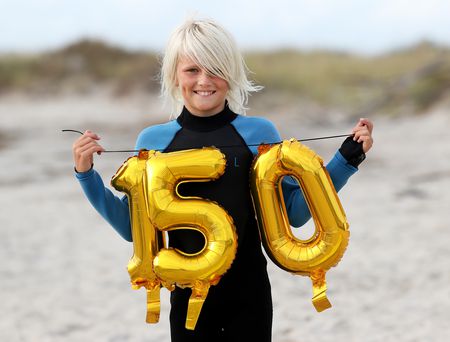Oct 1 · 8 min read
I met Stephan Jenkins, the lead singer of Third Eye Blind, in Pacifica, California, just after his band had finished their highest-grossing tour yet. Jenkins defied the traditional West Coast wardrobe, dressed in a black T-shirt and with black-painted toenails, and suggested that we do the interview on the beach instead of a nearby cafe. As we walked together on the sand, it was only natural to wonder if he was getting an “earthy” feeling, but I wasn’t going to ask. It has been over 20 years since he wrote the lyrics to his biggest hit, “Semi-Charmed Life,” which VH1 named one of the best songs of the ’90s. Ten years after its first wave of popularity, the song became a hit at millennial high school and college parties. If only he knew how many times I’ve drunkenly belted out, “The four right chords can make me cry.” But I wasn’t going to ask.
Instead we were meeting to discuss his sixth studio album, Screamer, which will be released on October 18, and to talk about his volunteer work. Jenkins teaches vets with post-traumatic stress disorder how to surf with the Jimmy Miller Foundation. Once Jenkins experienced how healing surfing could be, he wanted to share it with others who may need to get out of their heads.
But first, he also wanted to look at the waves to see if we could catch any after the interview.
“There have been, like, frenzies of birds out there because of the whales,” he said, pointing to the ocean. He was referring to the humpbacks, which, he said, have been closer than usual this summer. “Anything unusual, and I’m like, ‘Fuck you. It’s global warming,’” he said. This would be the first of many instances of “fuck you,” following which he would clarify, “Not, like, fuck you” (directed at me) “but fuck you” in the general, collective sense.
The topic of whales triggered a memory for him: that time when his friend who worked at the Point Reyes Bird Observatory took him out to the Farallon Islands for his birthday. On their way back to the coast, they ran into two blue whales. “I saw its eye as we went by, and they were like gods. And they are blue, and they are blue like your eyes are blue, Nicole.”
If you didn’t know he was a rock star, you would think he was just your average San Franciscan who hangs out with adventurous marine people. Jenkins attributes his affinity for the vast blue ocean and for catching waves to growing up in Northern California. Since he grew up in Palo Alto, surfing was a natural sport for him to gravitate toward as a teen, but he often found it difficult because of his focus on music. After college, he got sick for several years with chronic fatigue syndrome, which continued to keep surfing out of reach. He was so tired, he said, that even a walk down the beach was too much for him. Once he healed, his first album, titled Third Eye Blind, blew up. That kept surfing at bay, once again. It wasn’t until around 15 years ago that he decided to really commit to surfing and make it a “pillar” of his life. “It was like, ‘Fuck all of you. It’s surfing, and surfing is going to be foundational to my life,’” he said.
Part of his “fuck you” parade meant moving to a place closer to the ocean. He kept his place in the Mission and still lives there too. Surfing became more of a sport to him; it became his meditation because of the euphoric state he reached while on his board. “There is a moment when your mind, and actions for your body, and the interaction with nature become seamless,” he said. “It’s, like, a friend of mine said this — that in every other part of my life the cobwebs come in — work, snowboarding, yoga, meditation, and even sex, but it’s only in surfing that I’m thinking about nothing else.” That state of being, coupled with the “shh” of the ocean — which, he said, “is analogous to the sound of your mother’s blood when you are in the womb” — is also known as the definition of “nirvana.”
Eventually, he wanted to share this experience with others. Since surfing was so transformative for him, he believed it could be for others too. He said he was looking to do something outside of himself, and this self-inquiry led him to get involved with the Jimmy Miller Memorial Foundation, a nonprofit that shares surfing with active-duty marines and vets afflicted with post-traumatic stress disorder. “These guys are still out there with their struggles, but this wave, this presence can bring you into a state of aliveness and presence and joy,” he explained. “It brings you home.”
Jenkins volunteers as a surf instructor at Camp Pendleton in Southern California as well as sometimes in Hawaii. He also fundraises for the nonprofit. When he works with vets, he says he’s catching his favorite waves, not when he’s on a surf trip in Indonesia. Once, he recalled, he was teaching a woman who had served in the army. Out on the water, her rash guard crept up, and he could see that she had fire burns on her back. “There are things she might never be able to talk about,” he said. “We are out there, and I push her out, and this one — she catches some green, and she is going down the line on it, and she paddles back out. And this time her face — I see her face show up. I watched her come home. I watched her show up.”
Jenkins said that surfing, which the Miller Foundation explains is ocean therapy, isn’t a lasting cure; rather, it’s more like a really effective Band-Aid. He emphasized that this doesn’t mean that he’s some sort of therapist. “I don’t know anything about therapy, and I’m not even a good surf coach, but I do subscribe to the simple message of this: We are grateful for you, and we want to give you the gift of surfing and let the power of the ocean heal you and bring you home. And that is something I can humbly assist with.” He said that if a veteran wants to get a “high wave count,” they probably will want to work with another coach. Of course, this philanthropy benefits him too.
“You know some TED Talk fucker talked about the kinds of happiness. There is having your primary needs met — food, shelter, sleep — and then there is some material stuff — new cameras, friends — but the ultimate thing that gives people happiness is some sort of service and giving beyond themselves,” he said. “The real joy comes in surfing with my friends, in sharing it, and that wave I told you about is one of the best waves I’ve had in my whole life.”
As much as the Jimmy Miller Foundation is about getting veterans in the ocean, it’s also about community. “There is something really isolating about not being deployed,” he said. “I think we have an obligation to them; they have been taxed so hard.”
The only caveat when it comes to volunteering is that he has not had enough time because he’s been busy recording the band’s sixth studio album, finishing a summer tour and, now, preparing for a fall one. While his volunteerism was not inspired by the current political situation, which Jenkins has a lot of opinions about, his new album is meant in some ways to celebrate resistance against the patriarchy. Jenkins said he has been inspired by the latest wave of feminism and how female artists like Tove Lo unapologetically have brought their authenticity to the mainstream radio. “Tove Lo going, like, ‘Let me fuck you right back, oh, oh, oh, oh — that’s like successfully bringing post-patriarchal, like, sexual dynamics on to pop radio, and when I heard that, I was like, ‘Wow, OK, well done, Tove.’”
A screamer, which is the name of his album and the title track, encapsulates the repercussions of the Trump administration. “I see women — young women — in this being unapologetic about their voices and sexuality, and I find that inspiring, and I find that connected to this punk-rock stance of, like, ‘You don’t tell me the manners — I tell you.” Alexis Krauss of Sleigh Bells, who sings on the title track, is a screamer, he said.
As far as politics go, he said he has considered running for office in San Francisco. London’s Breed’s initiatives to help the homeless aren’t even leaving a “dent” on the crisis, he said. Supervisor Aaron Peskin, he added, keeps Grant Street in a state of “decrepitude.” He shares similar views on how Silicon Valley has affected the city with others who have inhabited the city for decades. “This beloved city isn’t just status-quo NIMBYism, and it isn’t just buying off politicians so you can build a giant botched circumcision of a penis of a building,” he said. “It’s San Francisco. They should have made a good one, picked a better dick, right? Come on. Give that thing a bris.”
Before we can talk about dicks much longer, I ask if I’m ever going to get that surfing lesson I was promised. The wind is picking up, and I’m hopeful we might be in luck and catch a wave. We change into our wet suits, and he says he doesn’t have much time but that he’ll give me a short lesson. It’s more of a refresher since I’ve surfed a few times before. “The first thing is to not worry about anything I say right now. It will soak in eventually,” he said. We practice popping up on the board on the sand, which he explains his using yoga reference points. “Do a little cobra, then tree pose and pop up to Warrior 1.” I’d later learn that I had scratched my foot after we paddled out, but similar to the vets he teaches, I can’t feel the pain because I’m forced to be in the moment. Beyond the break, there is a magical stillness in the water. Paddle, paddle, paddle, and finally, I pop up for a second, only to fall back in the water, which wakes me up better than a cup of coffee. Back on shore, I no longer think about whether or not the sand is giving him an earthy feeling. Instead, I think about how the Bay Area does. When I asked what keeps him here, something San Franciscans ask themselves a lot these days, he said the city has a “legit earthy quality” to it.
“I’ve lived in New York for a while and Los Angeles, but I’ve never let go of San Francisco,” he said. “I ride my bicycle over a hill, and the light changes, and I imagine what the streets were like 140 years ago. I’m San Francisco to the bone, man.”






Recent Comments